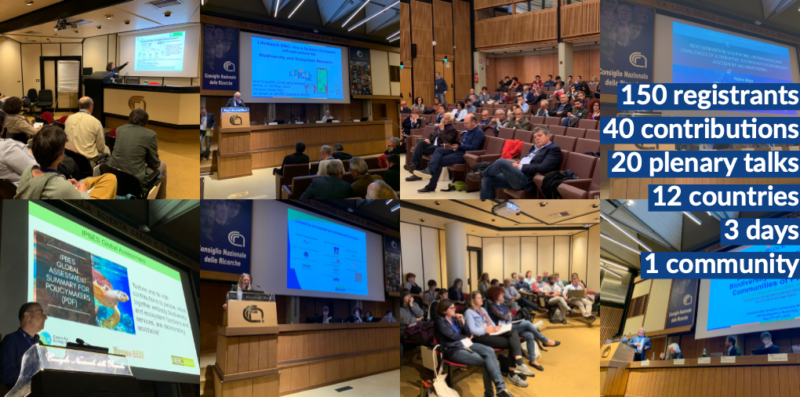
The Scientific Community Meeting held in Rome from 27 – 29 May 2019 was designed to bring together the wider LifeWatch ERIC scientific communities of researchers and developers to generate and advance the discussion of the most promising lines of scientific development. In the view of the conference coordinator, Alberto Basset, Interim Director of the LifeWatch ERIC Service Centre in Lecce and Professor of Ecology at the University of Salento, the 3-day event hosted by the Italian National Research Council, leader of the Italian contribution to the infrastructure, “was a great success”.
A truly international event, the meeting boasted 150 participants from 12 different countries which, thanks to the contributions given by LifeWatch ERIC Common Facilities and National Nodes (Belgium, Greece, Italy, Netherlands, Portugal, Slovenia and Spain), delivered to its participants a rich programme featuring 20 plenary sessions and 40 presentations in working sessions. The Scientific Community Meeting was the first of its kind and ended in widespread positive feedback and calls for greater interdisciplinary cooperation.
The three days were structured around the three complimentary strands of Biodiversity & Ecosystem Theory, Marine Biodiversity & Ecosystem Functioning, and Data, Modelling & Supporting Disruptive Technologies. There was widespread appreciation of the e-Science capabilities that LifeWatch ERIC provides, and agreement that the architecture is flexible with a user-friendly interface.
Many technologies and innovative case studies were also on display: from remote sensor monitoring of fauna and flora populations, to collecting data on marine life. But beyond gizmos, the working groups ended up agreeing on the need for collaboration, to work across borders and to use metadata to create user stories that everyone can relate to, to create greater common understanding.
Over these three days in Rome, LifeWatch ERIC has moved closer to identifying major gaps in scientific knowledge that need to be addressed, has emphasised key societal challenges that biodiversity and ecosystem science are required to address, gathered indications of the services and VRE developments that user communities need, proposed innovative approaches, like the use of blockchain, and has identified the need to reinforce collaboration and trust.
LifeWatch ERIC CEO, Christos Arvanitidis, closed proceedings by saying that the processes of life on this planet are complex; that we need complex infrastructures to model and understand that complexity, a task which no country can do alone; and that the scientific community has a responsibility to answer global concerns about climate change. He concluded, “We will use all our arsenal to integrate everything we have and try to give a synthetic knowledge to many more recipients, so we can make a proper response to society. All disciplines need to come together with open communication.”
You can find all of the presentations from the meeting on the minisite: www.lifewatch.eu/scientific-community-meeting